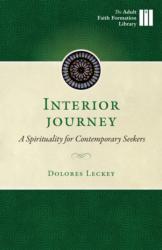 “Interior Journey: A Spirituality for Contemporary Seekers”
“Interior Journey: A Spirituality for Contemporary Seekers”
by Dolores Leckey.
Twenty-Third Publications (New London, Connecticut, 2015).
83 pp., $12.95.
A five-month sabbatical after experiencing several key losses in life “was salvific” for Francis, a Jesuit whose story is one of the many told in Dolores Leckey’s “Interior Journey: A Spirituality for Contemporary Seekers.”
“The anxieties associated with transition and with accumulated loss dissipated” for Francis during his sabbatical. At the same time it served him as a time of unique insight.
The sabbatical “revealed his subconscious attitude of ‘entitlement,’ namely, that somehow he was entitled to have his life move along smoothly.” He explained, “I had lost touch with my creaturehood.”
The account of Francis’ sabbatical appears in a chapter of “Interior Journey” devoted to “the power of gratitude.” Today, this Jesuit’s “cup of gratitude overflows because he knows that the Lord is ahead of him, beckoning him onward,” the author writes.
[hotblock]
Leckey calls attention in this context to medical research indicating that patients “heal much more quickly with an attitude of hope and gratitude, rather than what … Francis calls ‘entitlement,’ which often carries depression and anger in its wake.”
Few people, I am sure, consider themselves strangers to the sense Leckey describes that life sometimes does not “move along smoothly.” Indeed, a good many of us renew our spiritual journeys precisely when we feel under siege, so to speak.
Perhaps this is because of a long illness in the family, or a job loss, or the realization that an important goal of ours will not be achieved, at least not now. It is fascinating how real-life events and developments intersect with Christian spirituality, stimulating its growth and expansion.
This book’s great strength is its capacity to illustrate how this happens with stories of spiritual journeys in the lives of people much like me or you.
Such stories, the author says, “point to the possibilities for happiness if we trust the surprising path God is pointing us to.” They are stories about people who “went inward to find the courage to act, and to act creatively.”
[hotblock2]
The author’s honest writing and willingness to share personal experiences that pushed her own spiritual journey forward are another of the book’s fine points. Her countless friends and associates know well that spirituality is a driving force in her life, which she shares with them in rewarding ways.
In fact, while like many spiritual writers Leckey affirms that measures of solitude and quiet are essential to spirituality, she nonetheless firmly believes that room must be made for friendship and community. A concern otherwise, she writes, is “that one could live only for oneself.”
Leckey will be known to many as a former executive director of what is now the Secretariat of Laity, Marriage, Family Life and Youth at the U.S. Conference of Catholic Bishops. She is the author, too, of numerous books, including “Grieving With Grace” (St. Anthony Messenger Press) and “The Ordinary Way: A Family Spirituality” (Crossroad Publishing).
She hopes readers will view “Interior Journey,” which is part of Twenty-Third Publications’ Adult Faith Formation Library, as an invitation to know themselves by exploring the “inner space” that constitutes the “landscape of the soul.”
The book approaches spirituality under four headings: change; simplicity; solitude and friendship; and gratitude. Each of these “reflects an aspect of one’s spirituality, which is the innermost part of a life, where desire and hope and life sparkle.”
Individual readers intent on according a larger place to spirituality are sure to benefit from “Interior Journey,” but I can well imagine it serving as a valued resource for parish discussion groups, retreat participants, parish and diocesan staff members, classes and others.
“Interior Journey” is a brief book, easily read in a few hours. I hope, though, that readers will not finish it off too quickly, but revisit and reread various passages and paragraphs again and again.
“Prayer changes us,” Leckey insists. She mentions this after telling how, many years ago as a young mother, she “joined with other women to explore the world of prayer.” As the group’s members “grew more confident,” they shared their needs and worries.
[hotblock3]
“When we discovered that someone’s alcoholic father had joined AA, or that a depressed spouse was seeking medical help, or that the atmosphere of worry in someone’s life was lightened, we felt the Spirit’s encouragement to stay with it,” Leckey says.
A leitmotif of sorts emerges in the book through its occasional quotations drawn from meditations by Jesuit Father Karl Rahner, a major 20th-century theologian. “Let us step forth on the adventurous journey of the heart to God,” Father Rahner advises at the book’s conclusion.
He adds: “Let us forget what lies behind us. The whole future lies open to us. Every possibility of life is still open, because we can still find God, we can still find more.”
***
Gibson was the founding editor of Origins, Catholic News Service’s documentary service. He retired in 2007 after holding that post for 36 years.
PREVIOUS: ‘Kong: Skull Island’ is impressive monster movie with a message
NEXT: With new Nintendo game system, you may rather wait than switch



Share this story